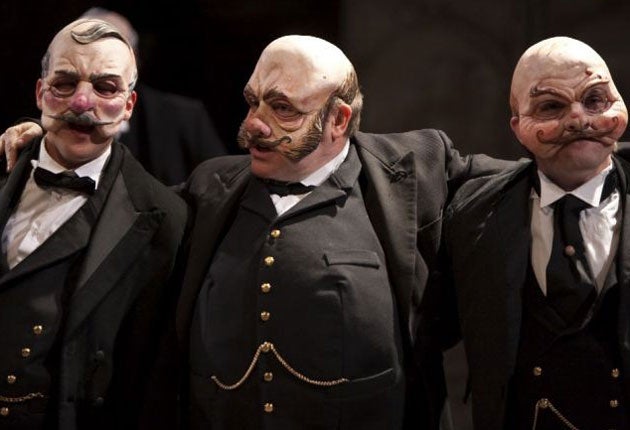The Ragged Trousered Philanthropists, Everyman, Liverpool
Red brigade in a class of their own

Outside Liverpool's Everyman Theatre a man is selling the latest issue of Socialist Appeal. After seeing this latest version of Robert Tressell's epic novel, The Ragged Trousered Philanthropists, we would surely have queued to buy a copy had not the vendor packed up for the day.
The adapation of Tressell's book is by Howard Brenton, a busy man who has just updated Büchner's Danton's Death for the National and written a new play about Anne Boleyn for the Globe. Here, we're set firmly in the fictional southern town of Mugsborough where a group of decorators living in abject poverty are doing up a house bought by the town's Mayor Sweater. The adaptation is framed by a couple of yuppies viewing the dilapidated mansion, the man trying to beat down the price. Near the start, the wife fades to the side of the stage to watch the history of the creation of the house. By the end, she's determined that they won't live in a residence built by little more than slave labourers at the behest of hypocritical Christians, exploitative capitalists and crooked councillors.
Simon Higlett's cunning set with its rotating and sliding panels transforms the mouldy interiors of the rooms of the big house to attractively decked-out walls (concealing papered-over cracks) and "Chinese-Moroccan" murals. In front of this tiered structure the space is easily converted into a worker's house or the outdoor summer "Beano".
Director Christopher Morahan makes deft use of his versatile ensemble cast, led by a quietly dignified Finbar Lynch as Frank Owen the muralist who attempts to instill some socialist principles into his fellow painters. Nothing makes the iniquity of their situation as underdog more clear than "The Great Money Trick" in which Owen divvies up pieces of bread to explain to his mates how they are being put upon by the capitalist class. "Money," he says, "is the principal cause of poverty."
Money and the bent ways of those in authority he might have said. The substitution of cheap materials, penny-pinching botched jobs, scant attention to health and safety, little concern for the workers' welfare and security – all these issues and more are raised in the stories from the book presented here. The gulf between the exploiters and the exploited is well illustrated in the masks donned by actors changing from overall-clad workers to besuited toffs. These fraudulent councillors are two-faced greedy pigs, wheeling and dealing to cover their profiteering tracks. From fiddling their expenses to dabbling in big-time corruption with rate-payers' money, from the mayor borrowing Corporation plants for his garden to a scam involving the Mugsborough Electric Light Company – the parallels with today are horribly obvious.
Larry Dann gives a salt-of-the-earth performance as old Joe while the earnest young Bert (Thomas Morrison) amuses himself creating a "Grand Pandorama" depicting Tories and Liberals in tandem, kicking the socialist on the ground because he said that the only difference between the other two was that "they was both alike". Indeed.
To 10 July (0151 709 4776); then Chichester Festival Theatre (01243 781312) 15 July to 26 August
Join our commenting forum
Join thought-provoking conversations, follow other Independent readers and see their replies
Comments
Bookmark popover
Removed from bookmarks